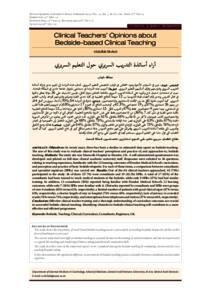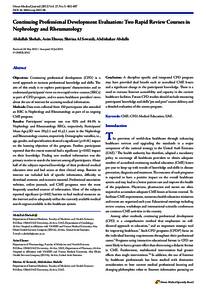وثيقة
Clinical teachers' opinions about bedside-based clinical teaching.
عناوين أخرى
آراء أساتذة التدريب السريري حول التعليم السريري
الناشر
College of Medicine, Sultan Qaboos University.
ميلادي
2013-02
اللغة
الأنجليزية
الموضوع
الملخص الإنجليزي
Objectives: In recent years, there has been a decline in estimated time spent on bedside teaching.
The aim of this study was to evaluate clinical teachers' perceptions and practice of, and approaches to, bedside
teaching. Methods: The study site was Ninewells Hospital in Dundee, UK. A self-administered questionnaire was
developed and piloted on full-time clinical academic university staff. Responses were solicited to 36 questions
relating to teaching experience, familiarity with the 12 learning outcomes of Dundee Medical School's curriculum,
and perception and practice of basic bedside etiquette. For each of these items, a comparison between consultants
and specialist registrars (SPRs) was carried out. Results: Out of the 64 clinical teachers approached, 45 (70%)
participated in the study: 26 of them (57.7%) were consultants and 19 (42.3%) SPRs. A total of 17 (65%) of the
consultants had been trained to teach medical students at the bedside, while only 9 SPRs (47%) had had similar
training. In addition, 13 consultants (50%) reported being familiar with Dundee Medical School's 12 learning
outcomes, while only 7 (36%) SPRs were familiar with it. Obstacles reported by consultants and SPRs were groups
of over 6 students (65% versus 61%, respectively), a limited number of patients with good clinical signs (67% versus
63%, respectively), a shorter length of stay in hospital (73% versus 68%, respectively), lack of privacy in crowded
wards (76% versus 73%, respectively), and interruptions from telephones and visitors (57% versus 64%, respectively).
Conclusion: Effective clinical teacher training and a thorough understanding of curriculum outcomes are crucial
to successful bedside clinical teaching. Identifying obstacles to bedside clinical teaching will contribute to a more
effective and efficient programme.
برعاية
Sultan Qaboos University
المجموعة
URL المصدر
zcustom_txt_2
Shehab, Abdullah (2013). Clinical teachers' opinions about bedside-based clinical teaching. Sultan Qaboos University Medical Journal, 13 (1), 121.
الملخص العربي
الهدف: تبين في السنوات الأخيرة وجود انخفاض في الوقت المخصص للتعليم السريري. تهدف هذه الدراسة إلى تقييم مدى إدراك أساتذة التدريب السريري وممارستهم وطرق أساليبهم للتعليم السريري. الطريقة: أجريت هذه الدراسة في مستشفى ناينويلز بجامعة دندي في المملكة المتحدة. حيث تم استحداث استبيان ذاتي وتجريبه على أساتذة التدريب السريري بالجامعة العاملين بدوام كامل، تضمن الاستبيان على 36 سؤالا يتعلق بالخبرة في مجال التدريس ومدى إلمام أعضاء الهيئة التدريسية ب 12 منهجاً للنتائج التعليمية في كلية دندي الطبية وخبرتهم وممارستهم لقواعد وآداب التعليم السريري. كما أجريت مقارنة لكل بند بين الأطباء الاستشاريين والاختصاصيين. النتائج: شارك في الدراسة 54 (70%) أستاذ سريري من أصل 64، أوضحت النتائج أن مجموع 17 استشاري(%65) تم تدريبهم لتعليم طلبة الطب في المستشفى، بينما خضع 9 اختصاصيين فقط (%47) لتدريب مماثل. 13 استشاري (%50) كانوا على دراية تامة ب 12 منهجاً للنتائج التعليمية بكلية دندي الطبية بينما 7 (36%) من الاختصاصيين فقط على نفس الدراية بالمناهج التعليمية. العوائق التي تم ذكرها من قبل الاستشاريين والاختصاصيين كانت مجموعات لأكثر من 6 طلاب(%65 بالمقابل، %61 على التوالي)، عدد المرضى المحدود الذين يعانون من الأعراض السريرية الجيدة (%67 بالمقابل، %63 على التوالي)، قصر مدة الإقامة بالمستشفى (% 73 بالمقابل، % 68 على التوالي)، الافتقار إلى الخصوصية في العنابر المزدحمة (%76 بالمقابل، %73 على التوالي)، الإزعاج الناتج عن الهاتف والزوار (%57 بالمقابل، %64 على التوالي). الخلاصة: فعالية برامج التأهيل والتدريب التي يلقاها أساتذة التدريب السريري وقدرتهم على فهم مناهج التدريس بدقة تساهم بشكل كبير في نجاح التعليم السريري. كما أن تحديد العقبات التي تؤثر سلبا على التعليم السريري سيساهم أيضا في الحصول على برامج أكثر فعالية وكفاءة.
قالب العنصر
مقالات الدوريات


